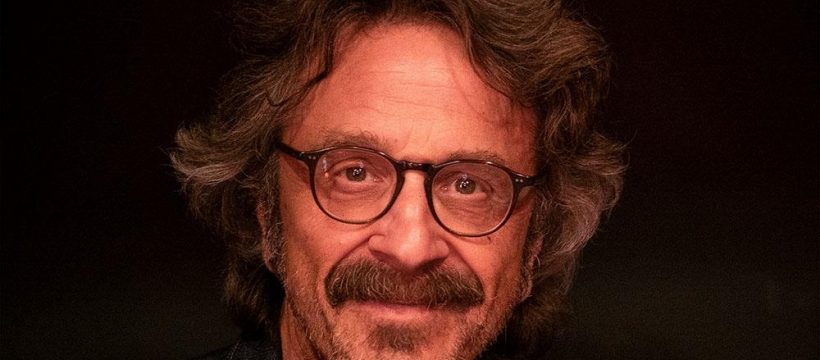“From Bleak to Dark,” the title of Marc Maron’s latest comedy special, perfectly encapsulates his prickly worldview. Those looking for benign reflections on the sunny side of life should just… move along. But it also hints at the comedian’s ability to find a ray of humor in even the most tragic circumstances.
“That’s what I do in my comedy,” Maron says. “I lighten up darkness.”
And “Marc Maron: From Bleak to Dark,” which premieres on HBO on Feb. 11, delves into some pitch-black terrain, notably the 2020 death of his girlfriend, indie film director Lynn Shelton, at only 54. Maron’s grief forms the spine of the moving, deeply personal and always hilarious show, one that finds him talking about processing Shelton’s loss during peak COVID. For good measure, Maron also delves into global warming, his father’s dementia and even the Holocaust, making it clear that the HBO special’s name isn’t a misnomer.
Did you miss performing during lockdown?
I didn’t miss comedy at all. I didn’t do any of those weird outdoor drive-in Zoom shows. I really felt like maybe I’m over it, maybe I’m all better and I don’t need this anymore. But as soon as other people started working, the race was on.
In the show, you joke that most men are “desperately” pro-choice when they’re involved in an unwanted pregnancy. After Roe v. Wade was overturned, did you feel like you wanted to weigh in?
I needed to talk about abortion without sounding over-the-top lefty crazy. What I’m saying is practical. I don’t think it’s political. It comes from personalizing the male experience.
Why did you decide to make Lynn Shelton’s death part of your show?
It was devastating. The whole thing was horrendous and tragic in so many ways, just the loss of Lynn and her dying at such a young age and being so vital. I’m still fucked up about it in a PTSD kind of way, but I believed there was a dialogue about loss that needed to happen. The nature of grief is nebulous and ongoing. It takes various shapes and intensities, but it can reactivate easily. Any laugh that anyone can get in the face of tragedy is welcome.
How should people respond when someone experiences a loss like you did?
All you’ve got to do is sit there and be there with them. You bear witness to these feelings. That’s part of the human experience. Everybody will eventually go through this at some point. Jews are pretty good with this death thing. That’s why we sit shiva. We’re like, “We’re going to sit with this for a week. We’re going to do this until it’s in our bones that we’ve lost this loved one.”
Was it therapeutic to talk about Lynn’s death on stage?
It helps, but it’s also delicate. We were not together that long. Our relationship was relatively new. Right after she died, people were asking me to do interviews, and I did a piece in the New York Times. That’s when a cousin of Lynn’s said, “Look, there’s other people grieving here. Maybe you should pull back a little bit on discussing it publicly.” I had to understand that and respect that.
You make jokes about death, abortion, the Holocaust. Are there lines you won’t cross?
You can make a joke about anything. Should you? That’s up to you. Are there consequences to doing certain jokes? Yes. Is it worth the risk? Again, up to you. Should you respect other people? Of course. Does that mean you can’t do a joke about them? Not necessarily. But there are a lot of people who are anti-woke and who believe that making jokes about marginalized people and using slang that is outdated just for effect is somehow pushing the line comedically. That’s a cop-out.
You also talk a lot about global warming and COVID and this crazy political time we’re living through. Is there anything you feel optimistic about?
What makes me optimistic is that I still might get out of this world before it gets really horrible.
You’ve had amazing guests on “WTF With Marc Maron,” with everyone from Barack Obama to Robin Williams stopping by. Are there any dream interviews that you’d still like to land?
There’s not some white whale. There are people I’ve always wanted to talk to, but it doesn’t seem like are going to happen. I don’t know why Albert Brooks won’t talk to me. There are just some people who don’t do that kind of stuff. I think Nic Cage would be pretty great to talk to. There’s people that I just haven’t gotten around to, like Elaine May. Right now, I’ve been on run with Kelly Reichardt’s movies, so I want to have her on.
You are proudly childless. What is the best part of not having kids?
I’m a neurotic, selfish man, and that requires a lot of time. When you don’t have children, you have that time.
Read More About:
Source: Read Full Article
